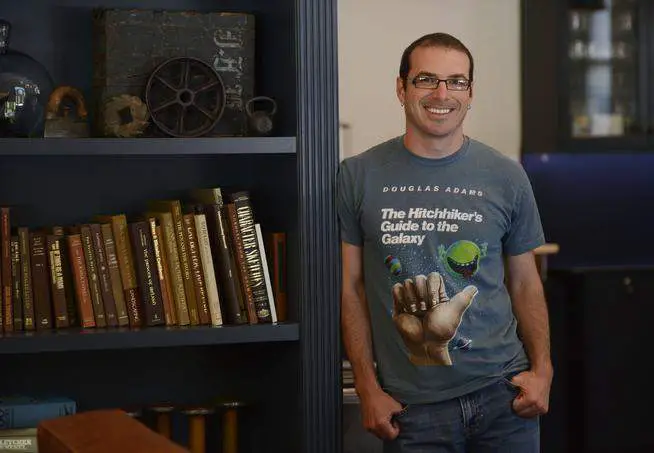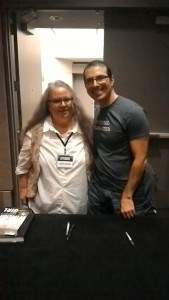One of the reasons I jumped at the chance to attend the recent NerdCon: Stories convention was the opportunity to meet a number of authors that I have admired for years. One of those authors is Paolo Bacigalupi.
I first encountered Mr. Bacigalupi’s writing in 2010, after his book, The Windup Girl, won both the Hugo and the Nebula for best novel. I was immediately taken with his tale where reckless corporate bioengineering had ravaged the future world; his complex and gritty story, the elegance of his prose, the vivid details – his extraordinary writing – completely captivated me.
Then (for me) came Zombie Baseball Beatdown, something completely different. Aimed at middle school readers, this easy to read yet underlyingly complex story centers on a group of kids in a small Iowa town who find themselves in the middle of a zombie infestation (due to practices in the local meatpacking plant). It is an appropriately gory (and smart alecky) tale that effortlessly blends in issues of illegal immigration, corporate irresponsibility, and class and racial discrimination along with the undead horror (and accompanying slime and such).
The Doubt Factory followed, and most recently, The Water Knife. They also tackle big issues: pharmaceutical chicanery and the politicizing of water rights in a drought stricken future; backdrops to beautifully written tales. And that doesn’t take into account his books that I haven’t read yet: the National Book Award winning Ship Breaker, and Pump Six and Other Stories, which won two Locus Awards.
So when I realized Paolo (I think he’d be okay with me calling him “Paolo”) was going to be at NerdCon: Stories, I was stoked. Planning my agenda to attend all of his panels, and to go to his signing, I was especially looking forward to even a few seconds talking to him, and hoped I wouldn’t become a gibbering idiot when it was my turn at the table.
What happened instead totally exceeded my expectations. Not wanting to hog the signing table when there were others waiting, I took a chance. While Paolo was personalizing my copy of The Windup Girl and we were exchanging pleasantries, I screwed my courage to the sticking post and asked, if there was time at the end of the end of the session, would he be willing to spend a few extra minutes to answer a few questions for me?
And you know what? He said yes!
So after all the autographs had been given and all the pictures were taken, I sat down with him, and we had a splendid little chat. And by golly, he’s as nice and as articulate and as lovely a person as I had ever hoped he would be.
Not wanting to monopolize Paolo’s time too far, I jumped right to the chase, asking him a question that I think of quite often: when I read an author’s work that totally blows me away, how do I help him/her promote that work? Writing for LitStack, I have the honor and privilege of sharing my views with all of you, but when I really, truly love a book, I want to do more. What can I do to get the word out that I think this book, this author, is really, really good?
Paolo and I discussed this for over 15 glorious minutes. He started by reiterating that you should never underestimate the power of word-of-mouth. Talking to friends, family, acquaintances, is a huge boon for an author and can really get the buzz circulating on his or her work.
But another powerful way to help an author is to write reviews, or to leave comments on websites, especially the “big” sites like Amazon and Goodreads. The reviews or comments don’t have to be lengthy, they don’t have to be deep – they don’t even need to be totally positive! They just need to give a true impression of an author’s work.
What this does on the surface is to show that someone liked this book enough to take the time to comment on it. If lots of people do that, then the simple message is that the book is popular (one assumes for a reason). Many people looking for information on a book will search for reviews, either generally or on the mega-sites, so having a good showing of reviews for a book speaks quite well of it, even if very few of them actually get read in their entirety.
Plus, with sites such as Amazon, the more comments an item gets, the more the algorithms that pop items up faster in searches and push an item higher in the rankings in favor of that particular book. That can be a huge boost to an author.
I was aware of most of this, but sometimes it’s hard to know what to trust when information seems to be just floating around in the ether, so having an established author such as Paolo Bacigalupi endorse it made it, well, gospel. I did ask if he was ever concerned about all the hoopla surrounding insincere or farmed reviews (ones meant merely to bash a quality work or artificially boost a poor one). He said that while sometimes that does happen, it generally still holds true that any review is a good review in that it generates interest.
I really enjoyed how once we had settled on a single topic (rather than me going down a checklist of things for him to answer: where does he do his writing, what time of day does he like to write, what is his favorite color, what is the air-speed velocity of an unladen swallow, etc), he spoke with care, with conviction, and with sincerity. I really felt like I was talking to a human being, rather than An Established Author, and this made me appreciate him all that much more.
I would have liked to have talked to him a lot longer. I would have liked to have quizzed him about his research techniques (since so many of his books have a strong social agenda) and how he keeps all the necessary research straight – all the names and places and rulings and offices and government acronyms, and so forth (something he had touched on in a previous panel). How he approached writing for different audiences differently, having written award winning works for middle school, young adult and adult audiences. What is it that compels him to write stories with underlying social messages? But there was not time for any of these questions – he had other places to go. Yet as he was getting up from the table and pulling on his jacket, I had one more thing to tell him.
I told him about how much I loved Zombie Baseball Beatdown, especially after reading The Windup Girl. That I really appreciated how his low his key approach to issues such as illegal immigration and racism made it seem as though they were just another normal part of life for Rabi, Miguel, and Joe, making the book that much more awesome because those things are just another part of life for so many real kids out there.
That brought a huge smile to his face, a genuine smile. He told me that Zombie Baseball Beatdown was actually a “secret” project of his, something he turned to when he had hit a major roadblock on the contracted book he was writing at the time. I would have liked to have explored that more, but he was already on his way out the door, on to his next thing. But he gave me one last big smile, one last “thanks!” and a wave before he disappeared. And I felt so incredibly gratified to be able to share with him some good thing that hopefully he’ll remember long after memories of me or the earlier conversation we had are long gone.
And now I have a job to do. Time to start moving some of my reviews over to Amazon, to Goodreads, to the Barnes and Noble website. Because if there’s any way I can help out an author as good (in multiple ways) as Paolo Bacigalupi, then by golly, I want to be part of that!
Thanks, Paolo!
~ Sharon Browning
**This interview first appeared on LitStack in October 2015**


